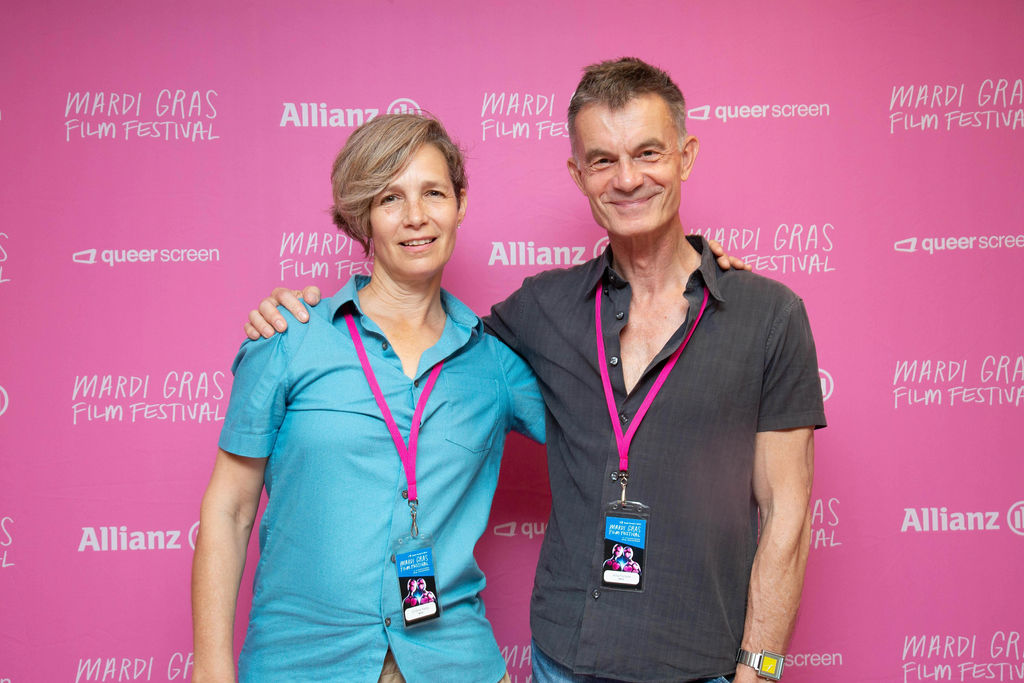
06 Mar Guest Interview: Jörg Fockele and Ondine Rarey
Queer Screen sat down with Sally co-producers and directors Jörg Fockele and Ondine Rarey which is currently streaming On Demand!

Queer Screen: Tell us about the documentary and why everyone needs to see it …
OR: One journalist who interviewed us about Sally! said: “I loved this film so much! I laughed. I cried. It’s not just about Sally Gearhart, the lesbian separatist feminist icon from the 1970s, it’s about life.” People who watch our film – young and old, male and female, straight and gay – so often seem to emerge deeply moved.
JF: On its surface Sally! introduces viewers to someone whose essential contribution to history has been largely forgotten. But on a deeper level the film explores the relationship between the leaders of social justice movements and the hundreds and thousands of people working “behind” them. Sally Gearhart was not only a co-creator of second wave feminism, lesbian separatism, women’s studies programs and the struggle for queer rights but also a product of all of them.
What do you hope audiences take away from your film?
JF: “History repeats itself” is such a cliché that it’s easy to forget how true it is. In the United States, with “Don’t Say Gay” laws in Florida, book bans in various states and cruel legislation targeting the trans community, we are facing the exact same tactics from the religious right as the ones that were used against our communities in the 1970s. Sally! reminds us not only that we need to continue to fight but also how to fight.
OR: Sally Gearhart is the kind of political activist that our highly divided and polarized worlds need right now: someone whose greatest passion was communication and who believed in reaching across the aisle with humour, respect and curiosity while staying true to her deepest beliefs and values.
There are more channels for LGBTIQ+ films than ever before, why are queer film festivals like ours still important?
OR: We were so isolated during the editing process, and it is such a scary time to be LGBTQ+ in the United States. Sharing the film in person at festivals like this one has been a precious gift, connecting us to wonderful communities around the world that have made us feel less alone, more hopeful, joyous and resilient.
JF: In my mind the successful queer film festivals, the ones that managed to survive COVID and the competition with thousands of hours of queer contents online, are the ones that are more than a way to see films. We don’t need that any more. But the community these festivals create – the opportunity to meet other queer folks outside of the bar scene, to stand in line with strangers and compare notes about films, to flirt, to meet new people at festival parties and events – those are experiences you won’t have online or at home in front of your TV. [NB: Except when you’re watching MGFF on demand with family, friends, and pets, of course!]
What was the first LGBTIQ+ film you saw that really impacted you?
OR: My Beautiful Laundrette by Stephen Frears, 1985. I remember that I didn’t have the courage to use the words “lesbian” or “queer” in the early 90s, but my best friend and I could address our letters to each other with the title of that movie!
JF: That one stood out for me too! I studied queer films in Germany in the late 1980s and in that context saw quite a few early queer movies over a very short period of time and My Beautiful Laundrette not only depicted a gay love story with a happy ending, but it focused on a young Pakistani-British man and a white punk boy. Even by today’s standards the film has a certain subversive quality. I loved both the intensity of their love story as well as the edginess.
Our festival theme is all about love – the love of queer cinema, the love of queer storytelling and the love of the queer community. What’s the first film that pops into your mind when you think of those concepts (and why that film)?
OR: It’s funny, we were interviewed by two journalists from the podcast Gaywaves and afterwards, just for fun, one of them showed me a video his autistic queer students had made about a guy who used to bully them. It was one of the funniest things I’ve ever seen! Here’s to those kids, their future and all the wonderful queer films we will hopefully get to watch in the future!
What is one piece of career advice that you would give your younger self when it comes to filmmaking?
OR: It is incredibly hard to maintain work-life balance in this line of work, but mental health is essential—not only to a happy life but to being able to do this work long term. Pushing back against being taken advantage of can’t start early enough, though I know it can be tough.
JF: The short answer is that I would tell myself exactly what I did: follow your dreams and follow your gut. There is a longer back story to this and obviously it takes a level of privilege to be able to do that—I’m well aware of it.
The program strand Sally! and other documentaries is screening under is called Preserving Our History. Thank you for telling a story as fascinating as that of Sally Gearhart’s, which may have been lost otherwise. How will you remember Sally?
JF: I will remember Sally as being just as smart, fierce and fiery as she was charming and warm. A rare combination.
OR: I will remember her as the lesbian “Gandolph” who changed my life! I think hundreds if not thousands of people could say the same.

